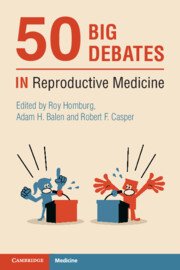Book contents
- 50 Big Debates in Reproductive Medicine
- Series page
- 50 Big Debates in Reproductive Medicine
- Copyright page
- Contents
- Contributors
- Foreword
- Introduction
- Section I Limits for IVF
- Section II IVF Add-ons
- Section III The Best Policy
- Section IV Embryology
- Section V Ethics and Statistics
- 30A Sex Selection Should Be Permitted for Family Balancing
- 30B Sex Selection Should Be Permitted for Family Balancing
- 31A Reproductive Medicine Should Be Publicly Funded
- 31B Reproductive Medicine Should Be Publicly Funded
- 32A Gamete Donation Should Be Anonymous
- 32B Gamete Donation Should Be Anonymous
- 33A Uterus Transplantation Is a Step Too Far
- 33B Uterus Transplantation Is a Step Too Far
- 34A Meta-analysis Should Not Be Considered Class A Evidence
- 34B Meta-analysis Should Not Be Considered Class A Evidence
- Section VI Male-factor Infertility
- Section VII Genetics
- Section VIII Ovarian Stimulation
- Section IX Hormones and the Environment
- Index
- References
32B - Gamete Donation Should Be Anonymous
Against
from Section V - Ethics and Statistics
Published online by Cambridge University Press: 25 November 2021
- 50 Big Debates in Reproductive Medicine
- Series page
- 50 Big Debates in Reproductive Medicine
- Copyright page
- Contents
- Contributors
- Foreword
- Introduction
- Section I Limits for IVF
- Section II IVF Add-ons
- Section III The Best Policy
- Section IV Embryology
- Section V Ethics and Statistics
- 30A Sex Selection Should Be Permitted for Family Balancing
- 30B Sex Selection Should Be Permitted for Family Balancing
- 31A Reproductive Medicine Should Be Publicly Funded
- 31B Reproductive Medicine Should Be Publicly Funded
- 32A Gamete Donation Should Be Anonymous
- 32B Gamete Donation Should Be Anonymous
- 33A Uterus Transplantation Is a Step Too Far
- 33B Uterus Transplantation Is a Step Too Far
- 34A Meta-analysis Should Not Be Considered Class A Evidence
- 34B Meta-analysis Should Not Be Considered Class A Evidence
- Section VI Male-factor Infertility
- Section VII Genetics
- Section VIII Ovarian Stimulation
- Section IX Hormones and the Environment
- Index
- References
Summary
Third-party reproduction is a significant proportion of the undertakings of most reproductive medicine clinics and practitioners. One of the most prominent concerns is the issue of anonymity of the gamete donor. This issue potentially impacts the intended parent(s), the donor and the donor-conceived child. Disclosure of a gamete donor carries less risk of harm to the donor-conceived child than non-disclosure. Whether the child is informed or not by the parent, in time, that older child/adult will discover there is an inconsistency in their genetic origins. How will you as the parent then answer those very awkward questions?
- Type
- Chapter
- Information
- 50 Big Debates in Reproductive Medicine , pp. 167 - 168Publisher: Cambridge University PressPrint publication year: 2021



